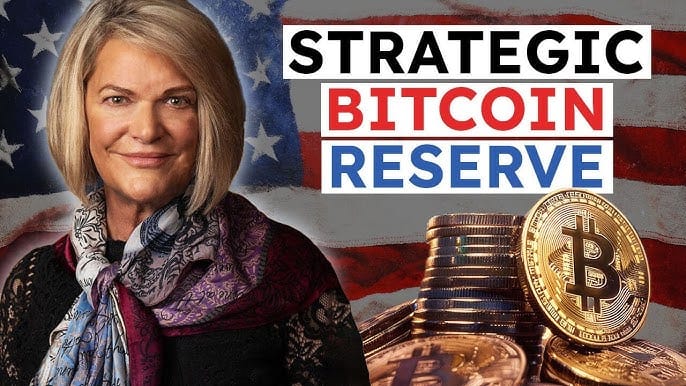Senator Lummis Advocates for U.S. to Swap Gold for Bitcoin in Strategic Reserve Plan

U.S. Senator Cynthia Lummis has introduced a bold economic strategy that could potentially reshape the U.S. financial landscape. During her appearance on CNBC this morning, Senator Lummis elaborated on her proposal for establishing a strategic Bitcoin reserve, suggesting a novel approach to managing the national debt and bolstering the U.S. dollar.
The concept of a strategic Bitcoin reserve has been floated by Senator Lummis in collaboration with President-elect Donald Trump. The idea is to leverage Bitcoin's appreciating value to both reinforce the U.S. dollar's status as the world's reserve currency and as a means to reduce the towering national debt. Bitcoin, often hailed as 'digital gold,' has seen significant value appreciation since its inception, making it an attractive asset for such a strategic move.
Senator Lummis articulated that this reserve would involve the U.S. government acquiring and holding Bitcoin for a period of at least 20 years. This strategy is rooted in the belief that Bitcoin, like gold, can serve as a stable store of value. However, unlike gold, Bitcoin's immutability and the ease with which it can be digitally stored make it a modern-day equivalent suited for governmental use. The plan isn't just about holding Bitcoin for the sake of it; it's envisioned as a proactive measure against inflation and the economic pressures currently felt by the American populace.
Economic Feasibility
One of the critical points Lummis addressed was the funding of this Bitcoin reserve. The financial implications of such a plan in times of budgetary constraints are significant. However, Senator Lummis proposed a solution that avoids direct expenditure from the government's budget. She highlighted that the U.S. already has reserves at the 12 Federal Reserve banks, notably including gold certificates. These certificates, held at their 1970s value, could be revalued to current market prices and then converted into Bitcoin. This method ensures that no new tax dollars would be required for the initial establishment of the reserve.
Lummis noted the existing government holdings of Bitcoin, approximately 200,000 BTC from asset forfeiture funds, which would serve as the seed for this strategic reserve. This approach not only circumvents the need for additional spending but also utilizes already existing assets in a new, potentially more productive manner.
Considerations
While the proposal has sparked interest among Bitcoin enthusiasts and those looking for innovative solutions to fiscal challenges, it isn't without its critics. Traditional financial analysts and some policymakers might view the shift from tangible gold to digital Bitcoin as a speculative move, given Bitcoin's historical volatility. There's also the question of how such a reserve would function in terms of liquidity and security, considering Bitcoin's decentralized nature compared to gold's physical presence.
Senator Lummis countered these concerns by emphasizing the immutable nature of Bitcoin and the possibility of storing it securely in various 'vaults' across the nation. This could theoretically offer a new layer of security, different from physical storage, leveraging blockchain technology's inherent features like transparency and security.
The move towards a strategic Bitcoin reserve could signal a significant shift in how governments view and utilize cryptocurrencies. If implemented, it might encourage other nations to consider similar strategies, potentially leading to a more widespread acceptance of cryptocurrencies in governmental financial strategies. This could also have profound implications for global financial markets, possibly influencing monetary policies and international trade dynamics.
Senator Lummis's proposal, while innovative, taps into a broader discourse about the role of digital currencies in modern economies. It reflects a growing acknowledgment of cryptocurrencies' potential not just as speculative investments but as legitimate components of a nation's economic strategy. This proposal could pave the way for further legislative and regulatory discussions on how best to integrate digital assets into the traditional financial systems without undermining economic stability.
Senator Lummis's advocacy for selling U.S. gold reserves to buy Bitcoin for a strategic reserve is a bold step towards redefining what constitutes national reserves in the 21st century. While the path to implementation might be fraught with skepticism and logistical challenges, the conversation it has ignited about the future of currency, debt management, and economic strategy is undeniably impactful. Whether this proposal will transition from discussion to action remains to be seen, but it undeniably sets the stage for a fascinating evolution in U.S. financial policy.

